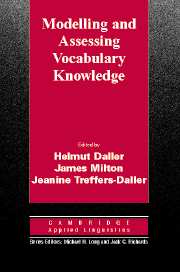Book contents
- Frontmatter
- Contents
- List of contributors
- List of abbreviations
- Acknowledgements
- Foreword
- Series Editors' Preface
- Editors' introduction
- I Fundamental issues
- II Vocabulary and learner differences
- III The unit of assessment and multiple vocabulary measures
- IV Metaphors and measures in vocabulary knowledge
- V Vocabulary measures in use
- References
- Appendices
- Index
Foreword
Published online by Cambridge University Press: 04 May 2010
- Frontmatter
- Contents
- List of contributors
- List of abbreviations
- Acknowledgements
- Foreword
- Series Editors' Preface
- Editors' introduction
- I Fundamental issues
- II Vocabulary and learner differences
- III The unit of assessment and multiple vocabulary measures
- IV Metaphors and measures in vocabulary knowledge
- V Vocabulary measures in use
- References
- Appendices
- Index
Summary
Modelling and assessing vocabulary knowledge are two sides of the same coin. Progress in modelling will help to develop more refined ways of assessing vocabulary knowledge, and empirical data from assessments will feed into the development of models for this aspect of language proficiency. The focus of this book is on both, modelling and assessing. The initiative for this book came after a BAAL/CUP workshop in January 2004 at the University of the West of England, Bristol. Researchers from various backgrounds were discussing their way of approaching vocabulary knowledge in the development and evaluation of measures, or in the discussion of models. After an intensive discussion over two days we decided to bring our views on this topic together by replying to the keynote chapter of Paul Nation, who outlined the threats to the validity of various measures of lexical knowledge. Chapter 1 of this book gives an overview of these threats; the remainder of the book is dedicated to the approaches to overcome these methodological problems. Overall, most researchers in the field stress that a single ‘one-size-fits-all’ measure or a ‘Holy Grail’ does not exist for the measurement of vocabulary knowledge. Instead many researchers stress the importance of multiple measures to give a valid picture of the lexical richness of a person. A broad variety of these measures are discussed in this book.
- Type
- Chapter
- Information
- Publisher: Cambridge University PressPrint publication year: 2007



